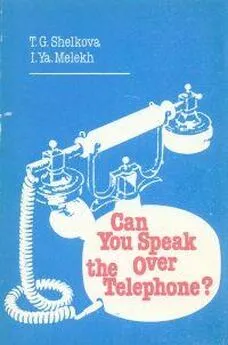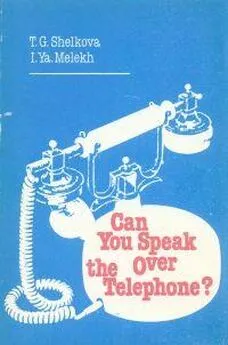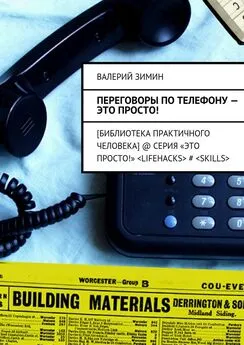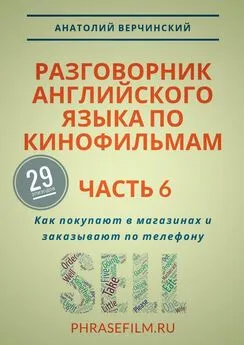Т. Шелкова - Как вести беседу по телефону
- Название:Как вести беседу по телефону
- Автор:
- Жанр:
- Издательство:Высшая школа
- Год:1989
- Город:М.
- ISBN:5-06-001624-2
- Рейтинг:
- Избранное:Добавить в избранное
-
Отзывы:
-
Ваша оценка:
Т. Шелкова - Как вести беседу по телефону краткое содержание
Ведение разговора по телефону на иностранном языке требует от обучающегося определенных навыков понимания, восприятия и удержания в памяти услышанного, а также незамедлительной словесной реакции на услышанное. Недостаточное развитие этих навыков является препятствием к тому, чтобы хорошо и уверенно говорить по телефону.
Пособие ставит своей целью помочь учащимся овладеть навыками беседы по телефону, пользоваться общепринятой терминологией.
Во второе издание (1-е — 1980 г.) внесены исправления редакционного характера.
Для лиц, самостоятельно совершенствующих свои знания английского языка.
Как вести беседу по телефону - читать онлайн бесплатно полную версию (весь текст целиком)
Интервал:
Закладка:
Mr Petrov: I’d like some things sent this morning, please.
D.D.: I’m afraid we can’t manage anything this morning. One of the van men hasn’t reported for work today. I’ll do my best to arrange it for this afternoon. May I have your name, please?
Mr Petrov: Mr Petrov. 14, Hereford Drive.
D.D.: Thank you. What would you like?
Mr Petrov: Eight pounds of potatoes to start with; a large sliced loaf; a medium-sized cauliflower; a pound of beef sausages; half a pound of minced beef; a large bag of self-raising flour; half a dozen large eggs. That’s all.
D.D.: I’m not sure whether we keep beef sausages. Excuse me a moment. I’ll just check that. (He goes off to check and then comes back.) Hello. No, I’m sorry. We’ve got pork sausages.
Mr Petrov: I’ll try that then. By the way, you forgot to send the invoice with my last order. Send it this time, will you? I’d like to settle my account as I’m going on holiday next week. Could I have a statement of what I owe?
D.D.: Yes, sir. I’ll inform the accounts section and they’ll fit in your order this afternoon and send you the statement.
Mr Petrov: Thank you. Good-bye.
D.D.: Good-bye.
Mr Blake: Good afternoon, Mr Vasiljev. This is Blake from the Protocol Department.
Mr Vasiljev: Good afternoon, Mr Blake.
Mr Blake: I’d like to bring to your attention that Flight 903 by which the Polish Delegation led by the Minister of Foreign Trade and Shipping is due to get to London is delayed. We’ve just had a message that owing to a dense fog all aircraft bound for London has been diverted to Amsterdam.
Mr Vasiljev: Thank you very much for letting us know. I wonder if you would be so kind as to give us a ring when you are sure of the time the plane will be arriving.
Mr Blake: Yes, don’t you worry. I’ll certainly do that. Good-bye.
Mr Vasiljev: Good-bye.
A gentleman enters a telephone call-box in a hurry, takes off the receiver and dials the number of trunk-call service at the exchange.
Operator: Trunk service. Number, please?
G.: Victoria 2904. I say, operator, will you hurry it up for me as I have to catch a train in a few minutes.
O.: Unless your number is engaged, I can put you through almost at once. Drop your coin, please, and press button A as soon as your number answers.
(The gentleman drops a coin and presently hears a high-pitched sound at the other end, the engaged signal.)
O.: I’m sorry, sir, your number is engaged. Will you press button В to get your money back? I suggest you try again in a minute or two.
G.: All right.
(After a while he rings the exchange once more.)
O.: Trunk service.
G: Will you try Victoria 2904 once more for me, please?
O.: Drop your coin, please. I have got your number! Hold the line, please.
G. (hears a voice): Are you there?
Voice (at the other end): This is Mr Jones’ house, 24 Strethem Road.
G: Oh, it’s you, Mary. Will you fetch Mrs Jones as quickly as you can.
Mrs Jones: Is that you, George, dear? How are you? So happy to hear your voice again! When will you be home again?
G.: I can’t hear you, dear. Your voice is ever so faint. There’s some background noise interfering.
O.: Can you hear your number all right?
G: No, I cannot, operator. Will you try and clear the line for me, please?
O.: Hold a minute, please. I think that’s better now.
G.: Are you there? Is that you, Lucy, dear? I say, can you hear me?
Mrs Jones: Yes, dear, I can.
G.: I’m arriving at Victoria at 5.40 this afternoon. Will you come to meet me there?
Mrs Jones: Certainly, dear.
O.: Your time is up. If you want to speak on drop another six-pence, please.
G: All right, dear, so long.
I. Read these dialogues and reproduce them as close to the text as possible.
II. What would you say on the phone in reply to these remarks or questions?
1. Nick had a bad case in the flu and he was taken to the hospital. 2. The train from Liverpool is delayed. 3. Your number doesn’t answer. 4. I am having my birthday party next Saturday. I wonder if you and your wife would care to come. 5. Would you like to make a personal call or a station-to-station call? 6. There is no direct service between Washington and Madison, but let me see what the best connecting point is. 7. We would like you to confirm your reservation in writing. 8. I’m calling you to inquire about books by Soviet contemporary writers. Where can I get them? 9. Then could you manage to come over on Monday at eleven o’clock? 10. I was delighted to hear of your promotion. Congratulations!
III. In what situations would you say the following?
1. Sorry to have caused you this inconvenience. 2. Say hello to your wife, please. 3. I’m afraid he won’t be able to attend the conference. 4. I wonder if Flight 753 is due to get to London on schedule. 5. The aircraft bound for Moscow has been diverted to Amsterdam. 6. I wonder if you would be so kind as to give me a ring when you come to know the date of his departure. 7. I’m pretty sure we’re free on Sunday but I’ll have to check with my wife. 8. My call is really urgent. 9. No, thank you. I’ll call back later. 10. How long will it take to have my suit pressed? 11. Could you tell me when you have flights from here to Moscow? 12. You hit the spot with your gift.
IV. Make calls according to these assignments:
1. You had your TV set repaired. But it does not work well. Report your complaint to the TV repair shop. 2. Thank your friends who sent you a birthday card and a gift. 3. Your colleague has been taken ill. Ask after his health. 4. Ask the Deliveries Department to send you foodstuffs. 5. The delegation which was due to be in London on Monday is delayed. Call off the meeting with the President of the Steel Corporation.
Read the dialogues aloud working in groups of two.
IV
FORMAL AND INFORMAL TELEPHONE CONVERSATIONS
The language used for speaking on the telephone is basically very similar to that of ordinary conversation, but limited in certain important respects by the special situation, which imposes a number of restrictions. Attention may be called to some of the chief differences between formal and informal telephone conversations. The most notable difference is that a formal telephone conversation is conducted at a much more formal level because the people speaking are taking care to maintain the high level of politeness usually felt appropriate in this kind of discussion. Another difference is that the formal discussion is very precise and factual, keeping to the point and never straying off into the chatty vagueness which is found at times in informal telephone conversations. Finally, there is of course a considerable difference in the vocabulary, with more technical terms than one would expect to find in the average informal telephone conversation, and a mixture of formal and informal words and phrases. Informal chatty telephone calls usually take place between friends who have nothing in particular to discuss and are simply engaging in a bit of social pleasantness. In this kind of telephone conversation there is a great deal of informal idiom.
A. FORMAL TELEPHONE CONVERSATIONS
Operator: Good morning. Hawles Engineering. Can I help you?
Mr Weston: I’d like to speak to Mr James Marsh, please, I think it’s extension forty-seven.
Operator: Who’s calling, please?
Mr Weston: My name is Weston. I’m from Plant Installations Limited.
Operator: Will you hold the line for a moment, Mr Weston? I’ll see if Mr Marsh is free [17] free : unoccupied
.
Mr Weston: Yes, thank you.
Mr Marsh: Hello. Marsh speaking [18] Marsh speaking : the generally accepted formal way for a man to announce himself on the telephone is for him to use his surname only, omitting the title Mr. An alternative, perhaps slightly less formal, would be to use the Christian name as well, which is generally accepted in American English, e.g. This is James Marsh speaking.
.
Operator: Oh, hello, Mr Marsh. I’ve got a Mr Weston [19] a Mr Weston : the fact that the operator uses the indefinite article with the name indicates that she does not know the caller.
from Plant Installations on the line [20] on the line : a standard phrase used by operators to refer to an incoming call
. Can you speak to him now?
Mr Marsh: Oh yes. Thank you. Put him through, please.
Operator: You’re through now, Mr Weston.
Mr Marsh: Hello, Mr Weston. What can I do for you? [21] What can I do for you? : almost a fixed phrase, which is very often used as a polite way of asking someone what he wants
Mr Weston: Good morning, Mr Marsh. You’ll remember that our surveyor [22] surveyor инспектор, приемщик
took another look at the floor of your main polishing shop last week.
Mr Marsh: Yes.
Mr Weston: Well I’ve just got his report, and’I thought I’d let you know the result.
Mr Marsh: Splendid [23] Splendid : an exclamation of approval which may sound to some people just a little too hearty or pompous
. That was quick work [24] quick work : often used to refer to anything that has been done quickly, not simply a job or work; e.g. “You made quick work of that ice-cream”, where the implication is that ice-cream was eaten quickly.
.
Mr Weston: Yes, it was quite quick, wasn’t it? And you’ll be pleased to know [25] you’ll be pleased to know : a fixed phrase which would be more appropriate in written English. It is one of the phrases which adds formality to this conversation, and would be unlikely in informal telephone conversations.
that he’s been able to confirm what he said in his original report. Mr Marsh: Has he? Oh, good.
Mr Weston: Yes, he says that the subsidence [26] subsidence осадка
hasn’t gone any further since he first inspected the floor, and that there’s no need to increase the strengthening measures he recommended.
Mr Marsh: Well I’m very pleased to hear that, Mr Weston. You’ve taken a load off my mind [27] You’ve taken a load off my mind : this phrase is colloquial, and is used by someone who has had a cause for worry or anxiety removed.
.
Mr Weston: Yes, I’m glad it won’t be necessary to hold things up [28] to hold things up : to delay proceedings (задержать работу)
on account of the floor. I’ll confirm all this in writing of course, but I thought that I’d let you know as soon as possible in the hope that we could agree on a defenite starting date.
Mr Marsh: Yes, of course.
Mr Weston: If we can fix that, then I can go ahead with arrangements here.
Читать дальшеИнтервал:
Закладка:










